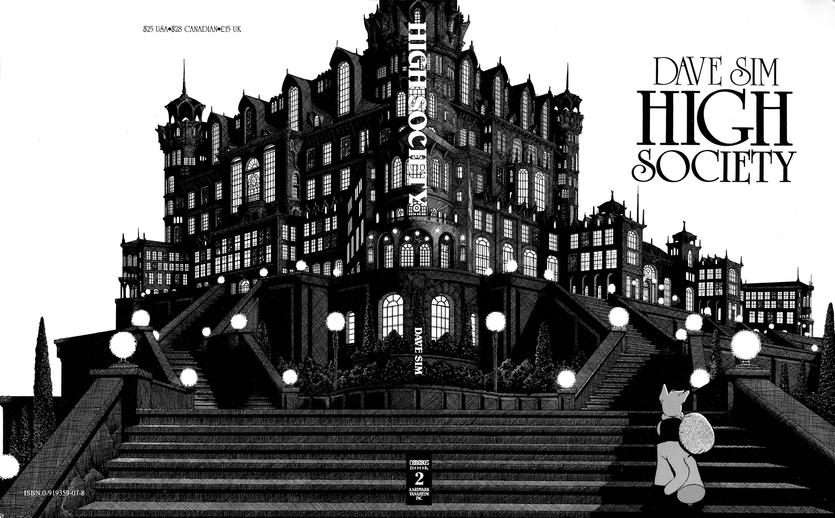Though we may not like that, sometimes good art is created by bad people or rather, people with bad worldviews. Cerebus: High Society is one example. Do you still read it?

Cerebus started off in the late seventies, part of a wave of creator owned self published titles made possible by the rise of the direct market. At the time it was a simple Conan the Barbarian parody, with an Aardvark as stand in for Conan as the joke. But as Dave Sim went on he became more ambitious, his stories more complex and interesting and eventually he created a single, five hundred page story told over twenty issues: High Society. Nobody else had done this at the time and Sim went even further and decided that from then on Cerebus would be one continuous story, one that would end with issue 300 and the Aardvark dying alone and unmourned.
Gone were the simple adventure stories and parodies, instead Cerebus went for cerebral plots revolving around political intrigue and religion and all that good stuff, the next two storylines continuing where High Society had started. As Cerebus evolved and Sim’s own interests changed, the series shifted further, into a more personal as well as more philosophical story. Which is where the trouble began. Because in issue 186 Sim set out his personal philosophy, his view of the world, through the text pages that had been part of Reads, the then running storyline which were written by his alter ego “Viktor Davis”. This positioned a creative, rational “Male Light” versus an irrational, emotional and devouring “Female Void”. As The comics Journal put it in issue 174:
A justification of — even, call for — misogyny as a philosophical stance, “Reads” comes on like a combination of a bitter post-breakup barrooom rant, biologic conspiracy, and bizarre male Objectivism (in the Ayn Rand sense of the term).
Things didn’t get better from there and Cerebus from Reads is dominated by Sim working out the ramifications of this philosophy. This, for most readers, did not make for a more interesting or entertaining series, regardless of the revulsion they might have felt for this stance in the first place. Though Sim did succeed in reaching issue 300 and Cerebus’ Demise, right on schedule in March 2004, the bloom had gone of it. What had once been seen as one of American comics’ greatest achievements was now an embarrassment. But what about the bits that, like the curate’s egg, were still good, not tainted by this misogyny? What about High Society?
For me, High Society was the first Cerebus I read, when I came across the phonebook version in my then regular comics shop. I knew about it, but had never read it or even seen an issue, so when I came across it I couldn’t help but read it then and there. I started buying the other then released collections, up until Melmoth. This was sometime in the late nineties, when the controversy had already erupted. I must’ve seen it discussed online, in the Usenet comics groups or the comix-L mailing list I was subscribed to. But at that point I knew too little of it to let it stop me from reading Cerebus. But looking at it twenty years after the series was finished, knowing Sim was and is still serious about this, it’s hard not to feel reluctant to reread even the good bits of Cerebus.
For me, this is not a case like that of a Neil Gaiman or Warren Ellis, who have had creditable accusations of sexual harassment brought against them. Those I find easy: regardless of how much these writers mattered to me (Ellis more than Gaiman), they won’t get my money anymore, nor am I inclined to reread or discuss what I’ve already bought from them. But Sim, to his credit, is ‘just’ a misogynist philosopher with as far as I know no such accusations brought against him. while his philosophy is revolting, he lacks the influence to be dangerous in the way an influencer like Andrew Tate is. Cerebus is just too impenetrable, too obscure outside a smallish circle of comics nerds to be dangerous.
And that’s due entirely to the fact that most people did stop buying Cerebus after this all came out. Cerebus may have reached its end as planned but by that time nobody cared anymore. Two decades on from that I personally don’t feel the need to continue this boycott anymore. (Confession time: I did actually buy the entire series in ebook form when it came up on Humble Bundle.) I think it is possible to read and examine the entirety of Cerebus again, something Tom Ewing has been doing recently. I don’t feel guilty for having High Society or any other Sim work in my collection, even if it is irredeemably tainted now.
No Comments